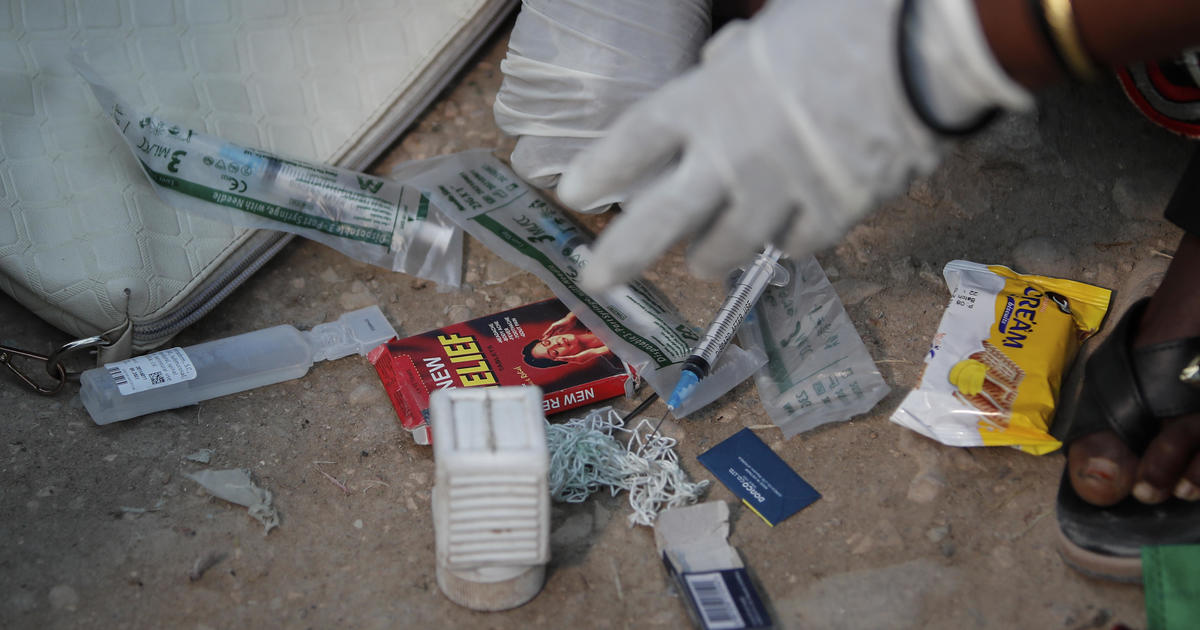CBS News
Gambia may become first nation to reverse female genital mutilation ban

Errekunda, Gambia — Lawmakers in Gambia will vote Monday on legislation that seeks to repeal a ban on female genital mutilation, or FGM, which would make the West African nation the first country anywhere to make that reversal. The procedure, which also has been called female genital cutting, includes the partial or full removal of external genitalia, often by traditional community practitioners with tools such as razor blades or at times by health workers.
Often performed on young girls, the procedure is incorrectly believed to control a woman’s sexuality and can cause serious bleeding and death. It remains a widespread practice in parts of Africa.
Jaha Dukureh, the founder of Safe Hands for Girls, a local group that aims to end the practice, told The Associated Press she worried that other laws safeguarding women’s rights could be repealed next. Dukureh underwent the procedure and watched her sister bleed to death.
Brian Inganga/AP
“If they succeed with this repeal, we know that they might come after the child marriage law and even the domestic violence law. This is not about religion but the cycle of controlling women and their bodies,” she said. The United Nations has estimated that more than half of women and girls ages 15 to 49 in Gambia have undergone the procedure.
The bill is backed by religious conservatives in the largely Muslim nation of less than 3 million people. Its text says that “it seeks to uphold religious purity and safeguard cultural norms and values.” The country’s top Islamic body has called the practice “one of the virtues of Islam.”
Gambia’s former leader, Yahya Jammeh, banned the practice in 2015 in a surprise to activists and with no public explanation. Since the law took effect, enforcement has been weak, with only two cases prosecuted.
On Monday, a crowd of men and women gathered outside Gambia’s parliament, some carrying signs protesting the bill. Police in riot gear held them back.
Gambia’s parliament of 58 lawmakers includes five women. If the bill passes on Monday’s second reading, it is expected to pass a third and final review before President Adama Barrow is expected to sign it into law.
The United States has supported activists who are trying to stop the practice. Earlier this month, it honored Gambian activist Fatou Baldeh at the White House with an International Women of Courage Award.
Susan Walsh/AP
The U.S. embassy in Gambia declined to say whether any high-level U.S. official in Washington had reached out to Gambian leaders over the bill. In its emailed statement, Geeta Rao Gupta, the top U.S. envoy for global women’s issues, called it “incredibly important” to listen to the voices of survivors like Baldeh.
The chairperson of the local Center for Women’s Rights and Leadership, Fatou Jagne Senghore said the bill is “aimed at curtailing women’s rights and reversing the little progress made in recent years.”
The president of the local Female Lawyers Association, Anna Njie, said the practice “has been proven to cause harm through medical evidence.”
UNICEF said earlier this month that some 30 million women globally have undergone the procedure in the past eight years, most of them in Africa but some in Asia and the Middle East.
More than 80 countries have laws prohibiting the procedure or allowing it to be prosecuted, according to a World Bank study cited this year by a United Nations Population Fund Q&A published earlier this year. They include South Africa, Iran, India and Ethiopia.
“No religious text promotes or condones female genital mutilation,” the UNFPA report says, adding there is no benefit to the procedure.
Girls are subjected to the procedure at ages ranging from infancy to adolescence. Long term, it can lead to urinary tract infections, menstrual problems, pain, decreased sexual satisfaction and childbirth complications as well as depression, low self-esteem and post-traumatic stress disorder.
CBS News
Gisèle Pelicot’s husband found guilty in mass rape trial in France

A judge in France on Thursday found the former husband of Gisèle Pelicot, who admitted to drugging and raping her repeatedly over the course of almost a decade and inviting dozens of other men to assault her as well, guilty of aggravated rape. Over the course of her trial, Pelicot — who insisted her full name be published and proceedings be made public — has been praised for her courage and become a symbol of the fight against sexual violence in France and around the world. The judge on Thursday was reading out verdicts for dozens of other men also accused of raping her.
Pelicot arrived Thursday at the court in Avignon, southeast France, where crowds had gathered outside holding signs saying: “Thank you for your courage.”
The trial began on Sept. 2, and almost every day, Pelicot came face to face with her former husband, Dominique, or one of the 49 other men charged with raping her. One other man faced a charge of aggravated sexual assault. She insisted that videos submitted as evidence, made by her ex-husband showing men sexually assaulting her while she appeared to be unconscious, be shown in open court.
The assaults took place between 2011 and 2020, when Dominique Pelicot was taken into custody. Police found thousands of photos and videos of the abuse on his computer drives, which helped lead them to other suspects. Some of the men testified they thought the unconscious woman was OK with it, or that her husband’s permission was enough.
“Gisèle Pelicot thinks that this shock wave is necessary, so that no one can say after this: ‘I didn’t know this was rape,'” her attorney, Stéphane Babonneau, told The Associated Press.
“It’s not for us to feel shame — it’s for them,” Pelicot said in court, referring to the attackers. “Above all, I’m expressing my will and determination to change this society.”
Controversial French laws
Pelicot’s case triggered protests across France, and there was hope among some demonstrators that the case could lead to changes in controversial French laws governing sexual consent.
France introduced a legal age of sexual consent in 2021 after a public outcry over the rape of an 11-year-old schoolgirl by a man who was initially convicted on a lesser charge. Since then, sex with anyone under the age of 15 has been viewed as non-consensual, but French law does not refer to consent in cases involving older victims.
Under French law, rape is defined as penetration or oral sex using “violence, coercion, threat or surprise,” without taking consent into account, according to the Reuters news agency. Prosecutors must, therefore, prove an intention to rape if they are to be successful in court, legal experts told Reuters.
Just 14% of rape accusations in France lead to formal investigations, according to a study by the Institute of Public Policies.
“Why don’t we manage to obtain convictions? The first reason is the law,” legal expert Catherine Le Magueresse told Reuters. “The law is written in such a way that victims must comply with the stereotype of a ‘good victim’ and a ‘true rape’: an unknown attacker, use of violence, and the victim’s resistance. But it is only true for a minority of rapes.”
“I’m trying to understand”
Speaking in court during the trial, Pelicot, who is 72, talked about how she had thought she was in a loving marriage with her husband and would never have guessed that he was drugging her.
“We would have a glass of white wine together. I never found anything strange about my potatoes,” Pelicot told the court.
“We finished eating. Often when it’s a football match on TV, I’d let him watch it alone. He brought my ice cream to my bed, where I was. My favorite flavor — raspberry — and I thought: ‘How lucky I am. He’s a love.'”
She said she didn’t have any sensation of being drugged.
“I never felt my heart flutter. I didn’t feel anything. I must have gone under very quickly. I would wake up with my pajamas on,” Pelicot told the court, adding that she would sometimes wake up “more tired than usual, but I walk a lot and thought it was that.”
“I’m trying to understand,” she said, “how this husband, who was the perfect man, could have got to this.”
CBS News
Teamsters going on strike against Amazon at several locations nationwide

The International Brotherhood of Teamsters says workers at seven Amazon facilities will begin a strike Thursday morning in an effort by the union to pressure the e-commerce giant for a labor agreement during a key shopping period.
The Teamsters say the workers, who authorized walkouts in the past few days, are joining the picket line after Amazon ignored a Dec. 15 deadline the union set for contract negotiations. Amazon says it doesn’t expect any impact on its operations during what the union calls the largest strike against the company in U.S. history.
The Teamsters say they represent nearly 10,000 workers at 10 Amazon facilities, a small portion of the 1.5 million people Amazon employs in its warehouses and corporate offices.
Amazon is ranked No. 2 on the Fortune 500 list of the nation’s largest companies.
At a warehouse in the New York City borough of Staten Island, thousands of workers who voted for the Amazon Labor Union in 2022 and have since affiliated with the Teamsters. At the other facilities, employees – including many delivery drivers – have unionized with them by demonstrating majority support but without holding government-administered elections.
The strikes happening Thursday are taking place at an Amazon warehouse in San Francisco and six delivery stations in southern California, New York City, Atlanta and the Chicago suburb of Skokie, Illinois, according to the union’s announcement. Amazon workers at the other facilities are “prepared to join” them, the union said.
“Amazon is pushing its workers closer to the picket line by failing to show them the respect they have earned,” Teamsters General President Sean M. O’Brien said in a statement.
“If your package is delayed during the holidays, you can blame Amazon’s insatiable greed. We gave Amazon a clear deadline to come to the table and do right by our members. They ignored it,” he said.
The Seattle-based online retailer has been seeking to re-do the election that led to the union victory at the warehouse on Staten Island, which the Teamsters now represent. In the process, the company has filed a lawsuit challenging the constitutionality of the National Labor Relations Board.
Meanwhile, Amazon says the delivery drivers, which the Teamsters have organized for more than a year, aren’t its employees. Under its business model, the drivers work for third-party businesses, called Delivery Service Partners, who drop off millions of packages to customers everyday.
“For more than a year now, the Teamsters have continued to intentionally mislead the public – claiming that they represent ‘thousands of Amazon employees and drivers’. They don’t, and this is another attempt to push a false narrative,” Amazon spokesperson Kelly Nantel said in a statement. “The truth is that the Teamsters have actively threatened, intimidated, and attempted to coerce Amazon employees and third-party drivers to join them, which is illegal and is the subject of multiple pending unfair labor practice charges against the union.“
The Teamsters have argued Amazon essentially controls everything the drivers do and should be classified as an employer.
Some U.S. labor regulators have sided with the union in filings made before the NLRB. In September, Amazon boosted pay for the drivers amid the growing pressure.
CBS News
Teamsters set to strike against Amazon at New York City warehouse

NEW YORK — The Teamsters union is launching a strike against Amazon at numerous locations across the country, including in Maspeth, Queens.
The Teamsters are calling it the largest strike against Amazon in United States history, and it’s set to begin at 6 a.m. Thursday. In addition to New York City, workers will be joining picket lines in Atlanta, Southern California, San Francisco and Illinois.
In a video announcement released Wednesday night, workers voiced their frustrations.
“Us being strike ready means we’re fed up, and Amazon is clearly ignoring us and we want to be heard,” one worker says in the video.
“It’s really exciting. We’re taking steps for ourselves to win better conditions, better benefits, better wages,” another worker in the video says.
The union says it represents about 10,000 Amazon employees and that Amazon ignored a deadline to come to the table and negotiate. The $2 trillion company doesn’t pay employees enough to make ends meet, the union asserts.
At the height of the holiday season, many are wondering what this means for packages currently in transit.
Teamsters President Sean O’Brien said, “If your package is delayed during the holidays, you can blame Amazon’s insatiable greed.”
Amazon says Teamsters are misleading the public
An Amazon spokesperson says the Teamsters are misleading the public and do not represent any Amazon employees, despite any claims.
“The truth is that the Teamsters have actively threatened, intimidated, and attempted to coerce Amazon employees and third-party drivers to join them, which is illegal and is the subject of multiple pending unfair labor practice charges against the union,” the spokesperson said in a statement.
An Amazon representative says the company doesn’t expect operations to be impacted.










